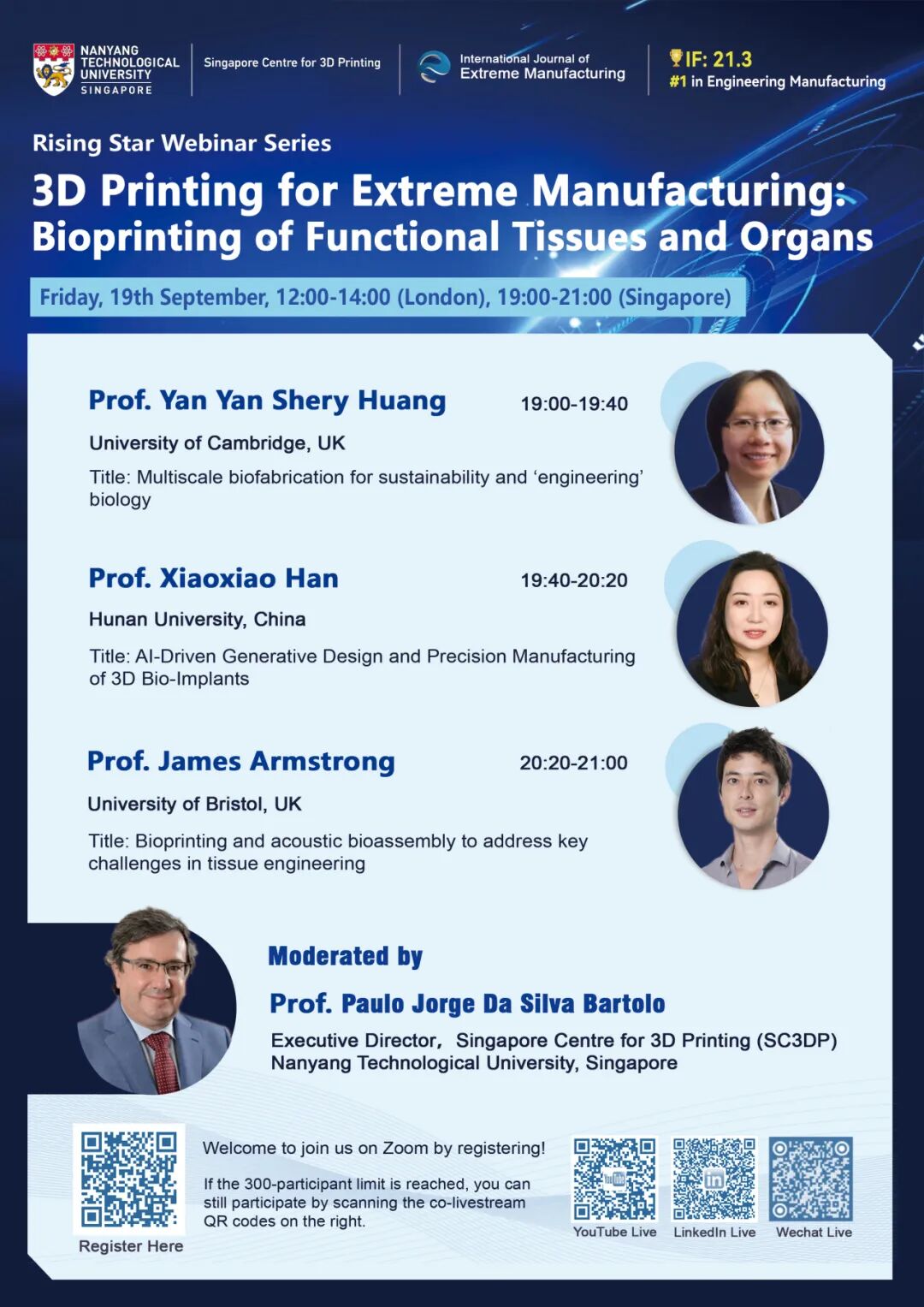
论坛主题
“软物质与生物集成电子器件”在线论坛
形式及时间
线上,2025年9月23日(周二)
北京时间 20:00-22:00
举办单位
主办:成均馆大学
支持:《极端制造(英文)》期刊

主持人
2025.09.23
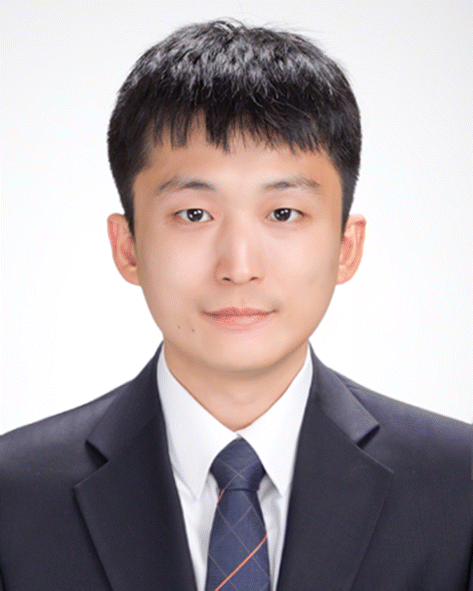
Sang Min Won
Sungkyunkwan University
个人简介
Prof. Sang Min Won received his B.S., M.S., and Ph.D. degrees in electrical and computer engineering from the University of Illinois at Urbana Champaign. He is currently an Associate Professor at the Department of Electrical and Computer Engineering, Sungkyunkwan University. His current research involves the exploration of materials and geometries in the study of sensors and stimulators designed for distinctive applications in advanced biomedical and/or health monitoring systems. Another topic of exploration is the integration of AI-assisted sensor data processing in diagnostic systems to uncover hidden signals related to diseases. He has co-authored around 100 publications in leading journals such as Nature, Science, Cell, Nature Electronics, Nature Materials, Nature Biomedical Engineering, Advanced Materials, Science Robotics, Nature Communication, Science Translational Medicine, and ACS Nano, with total citations >15,000 according to Google Scholar.
报告简介
2025.09.23
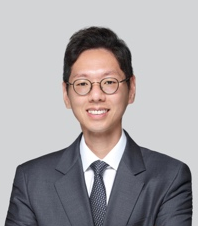
Jiheong Kang
Seoul National University
20:00-20:40
报告题目
Unlocking the Power of Supramolecular Chemistry in Soft Materials Design
报告摘要
Over the last two decades, supramolecular chemistry has seen remarkable advancements and has emerged as a powerful tool for designing dynamic materials. While its impact is well recognized in related research fields, its full potential in solid-state soft materials remains underexplored.
Our group has been working to unlock the potential of supramolecular chemistry in soft materials. In this presentation, I will discuss our insights and approaches to developing mechanically robust polymer networks and polymer composites.
In the first part, I will focus on the rational design principles of polymer networks crosslinked by supramolecular interactions to create high-performance elastomers with exceptional stretchability, toughness, and self-healing capabilities. Additionally, I will introduce a novel type of 3D printing photoresin for additive manufacturing applications.
In the second part, I will highlight new assembly methods for integrating nanomaterials into polymer matrices, a critical aspect of maximizing the properties of both components. Two examples will be presented: (1) the acoustic assembly of liquid metal droplets in a polymer matrix to achieve rubber-like elastic conductors, and (2) template-directed assembly of conductive polymers within hydrogel matrices to develop tissue-like bioelectrode materials. I will discuss not only the design of these materials but also their unique applications, showcasing how supramolecular chemistry can drive innovation in soft materials.
个人简介
Prof. Jiheong Kang is an Associate Professor in the Department of Chemistry at Seoul National University, Korea. He earned his Ph.D. in 2017 from The University of Tokyo under the supervision of Prof. Takuzo Aida and completed postdoctoral training in Zhenan Bao’s Research Group at Stanford University. His research group focuses on designing innovative molecules and polymers to address challenges in soft materials for healthcare and energy storage applications. Recognized for his outstanding contributions to chemistry and materials science, he has received several prestigious awards for young scientists, including the Asian Young Scientist Fellowship (2024), MIT Technology Review’s Innovators Under 35 Asia Pacific (2024), the Young Scientist Presidential Award (2023, Korea), and the Reaxys PhD Prize (2016).
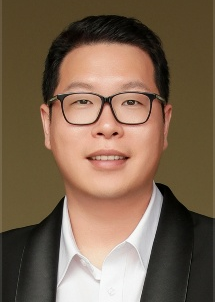
Sungjun Park
Ajou University
20:40-21:20
报告题目
Ultra-flexible skin-compatible organic optoelectronics for wearable application
报告摘要
Ultra-conformable organic optoelectronic devices hold great promise for next-generation wearable and biomedical applications. Their soft mechanical properties and compatibility with large-area, low-temperature fabrication enable close integration with the human body, making them ideal for skin-attachable sensors, soft energy harvesters, and bio-interfacing technologies. A major challenge, however, is ensuring long-term mechanical durability without compromising electronic and optical performance under repeated deformation. This work highlights recent progress in addressing this issue through advanced materials and device designs. Key strategies include the use of stretchable semiconducting and conducting polymers, and multilayer architectures that adapt to mechanical stress by reducing strain concentration. Experimental studies confirm that these devices maintain stable function under various mechanical stresses, such as bending, stretching, and twisting. Their utility is demonstrated in applications including real-time physiological monitoring, motion tracking, and human–machine interfacing. These findings enhance the understanding of mechanical-electronic interactions in soft electronics and provide useful design principles for developing durable, body-integrated optoelectronic systems.
个人简介
Prof. Sungjun Park is an Associate Professor in the Department of Electrical and Computer Engineering and the Department of Intelligence Semiconductor Engineering at Ajou University, Republic of Korea. He received his Ph.D. in Materials Science and Engineering from the Gwangju Institute of Science and Technology (GIST), Republic of Korea, in 2016. Following his doctoral studies, he conducted postdoctoral research at RIKEN in Japan and later worked as a Senior Researcher at the Samsung Advanced Institute of Technology (SAIT). Prof. Park joined Ajou University in 2020, where his research focuses on skin-conformal electronic materials, flexible devices, and their integration for wearable sensors and bioelectronics. His interdisciplinary work bridges materials science, electrical engineering, chemical engineering, and biomedical applications, aiming to develop next-generation soft electronics for healthcare and human–machine interfaces. Prof. Park has been widely recognized for his contributions to scientific research and innovation. In 2025, he was selected for the "Best Achievement" Award in the Top 100 Excellent National R&D Outcomes of 2024 by the Ministry of Science and ICT, Republic of Korea. That same year, he also received the Small Young Innovator Award from Wiley. Most notably, he was awarded the Order of Science and Technology Merit (과학기술포장, 科學技術褒章) by the Ministry of Science and ICT, one of the highest national decorations conferred for exceptional achievements in science and technology.
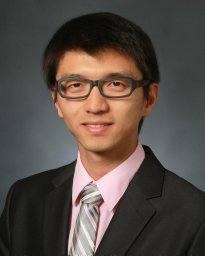
Larry Cheng
University of Bristol, UK
20:20-21:00
报告题目
Standalone stretchable device platform for biomedicine
报告摘要
Conventional electronics today form on the planar surfaces of brittle wafer substrates and are not compatible with 3D deformable surfaces. As a result, stretchable electronic devices have been developed for continuous health monitoring. Practical applications of the next-generation stretchable electronics hinge on the integration of stretchable sustained power supplies with highly sensitive on-skin sensors and wireless transmission modules. This talk presents the challenges, design strategies, and novel fabrication processes behind a potential standalone stretchable device platform that (a) integrates with 3D curvilinear dynamically changing surfaces, and (b) dissolves completely after its effective operation. The resulting device platform creates application opportunities in fundamental biomedical research, disease diagnostic confirmation, healthy aging, human-machine interface, and smart Internet of Things.
个人简介
Prof. Huanyu "Larry" Cheng is the James L. Henderson, Jr. Memorial Associate Professor of Engineering Science and Mechanics at Penn State University. His research group focuses on the design, fabrication, and application of the standalone stretchable device platform. Larry has co-authored more than 180 publications with total citations >26,000 according to Google Scholar. His work has been recognized through the reception of numerous awards, including Highly Cited Researcher in the field of Cross-Field since 2023, Advanced Materials Rising Stars, International Journal of Extreme Manufacturing (IJEM) Best Editor Award since 2022, Humboldt Research Fellowship for Experienced Researchers in 2022, 2021 National Institutes of Health (NIH) Trailblazer Award, MIT Technology Review Innovators Under 35 (TR35 China) in 2021, Forbes 30 Under 30 in 2017, among others. He also serves as the editor for Chemical Engineering Journal, Computers in Biology and Medicine, along with a reviewer for >300 journals.
关于期刊
International Journal of Extreme Manufacturing (《极端制造》),简称IJEM,中国机械工程学会极端制造分会会刊,致力于发表极端制造领域相关的高质量最新研究成果。自2019年创刊至今,期刊陆续被SCIE、EI、Scopus等20余个国际数据库收录。JCR最新影响因子21.3,位列工程/制造学科领域第一。中国科学院分区工程技术1区,TOP期刊。入选中国科技期刊卓越行动计划二期英文领军期刊。
期刊网址:
https://iopscience.iop.org/journal/2631-7990
http://ijemnet.com/
期刊投稿:
https://mc04.manuscriptcentral.com/ijem-caep
作者福利:
• 金色开放获取
• 提供绿色通道快速评审原创突破性成果
• 接收后24h内在线
• 免费全球化宣传推广
• 免费高质量图片编辑与规范化文献校对

转载本文请联系原作者获取授权,同时请注明本文来自SciOpen TUP科学网博客。
链接地址:https://wap.sciencenet.cn/blog-3563286-1502675.html?mobile=1
收藏

